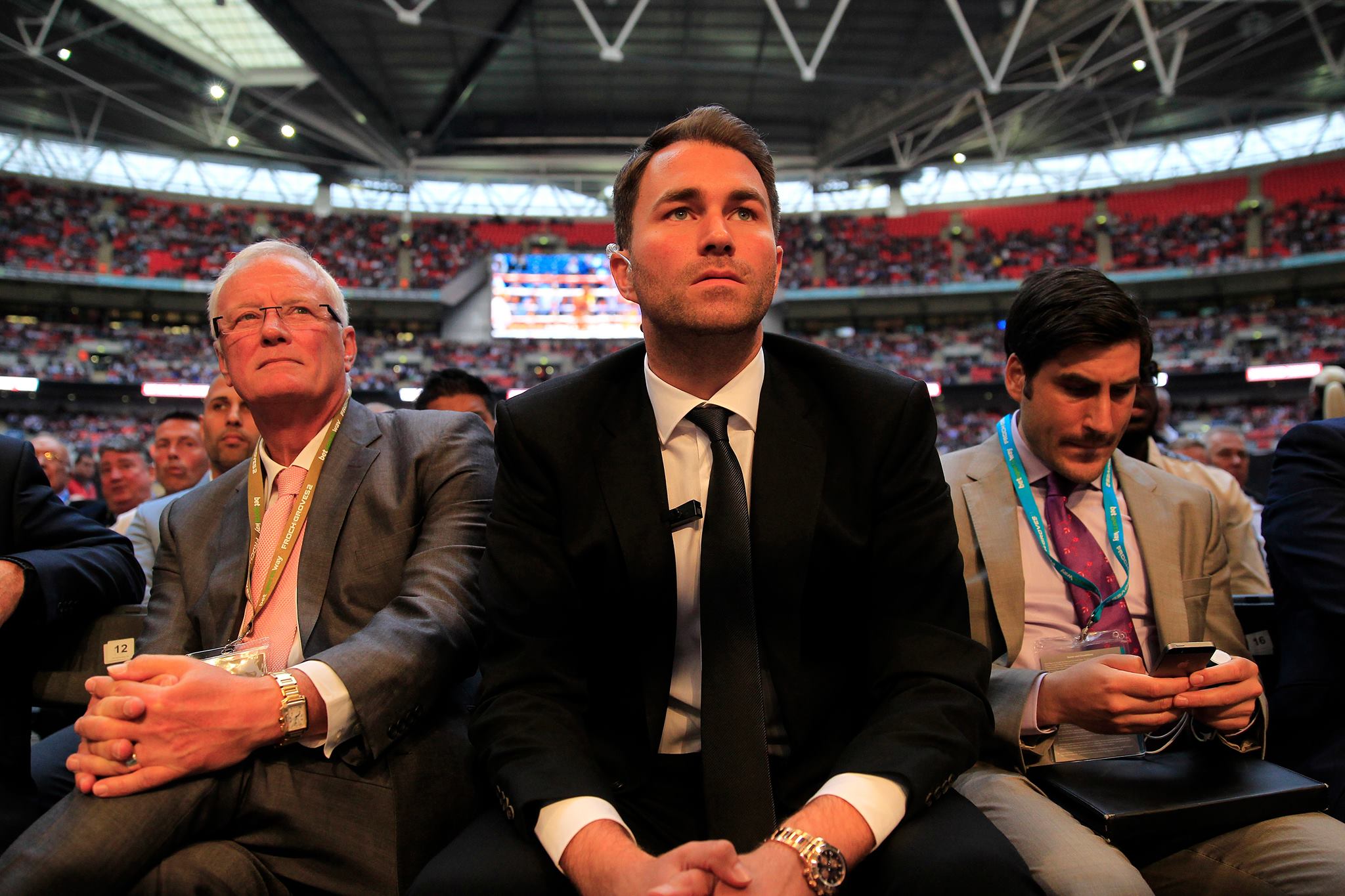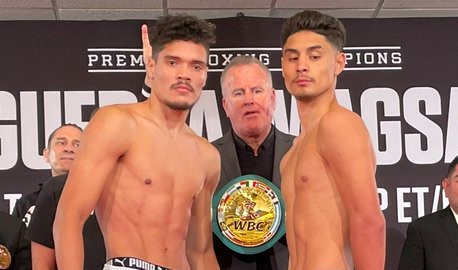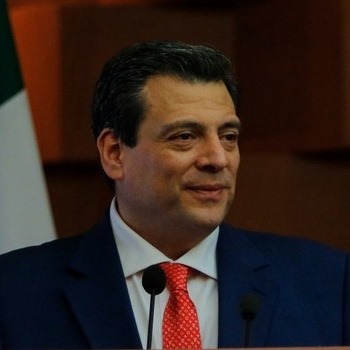By Charles Jay
I was talking the other day with a guy who owns a number of offshore sportsbooks. He’s a guy who likes boxing an awful lot, so I asked him what he thought about the heavyweight title fight this weekend. He said he didn’t know anything about it.
That doesn’t sound like particularly great news for boxing.

Amanda Westcott/DAZN
It’s not that he’s ignoring the news. It’s just that in the past, one might have heard about a fight for the heavyweight championship of the world, well, almost by accident. But that’s not the case here. My friend’s getting little to no betting volume on it, and that’s often a pretty good barometer of interest.
And that gives you a good idea about the gamble (pardon the pun) being made by DAZN, which is producing and streaming the fight, and Matchroom Boxing, the company run by Eddie Hearn, which is the promoter of the fight and the main attraction,. Anthony Joshua.
Oh, I’m sure there will be a healthy crowd at Madison Square Garden. But that isn’t the real battleground.
There is a reason that Joshua, the heavyweight champion as recognized by the WBA, IBF and WBO, is here in the United States for the first time. DAZN’s objective in engaging Matchroom in a contract for up to a billion dollars over eight years is not to conquer the U.K. market. America is the Holy Grail. To have control of the heavyweight title – or the vast majority of it – with Joshua as the anchor, is something they consider to be valuable currency in the U.S.
Toward that end, the goal on the part of Matchroom is that Joshua will establish his “brand” in the U.S., to put a critical piece in place toward a true worldwide profile. DAZN has a need to create its own brand, with Joshua being a major contributor to that presence, in addition to other parts of their boxing “portfolio,” which includes a $365 million deal for Canelo Alvarez, who is not controlled by Matchroom but has thus far fought two fighters with connections to the company to begin his part of the arrangement.
Normally the specific venue of a boxing show wouldn’t make all that much difference from a television standpoint, but the directive DAZN had for Matchroom was to place its boxing shows in major markets, in sizable arenas, with the notion that this would help with the branding objective. That’s brought mixed results. But there is a purpose here that goes beyond boxing.
There are a lot of streaming services out there, and more are coming, as Disney, Apple and Warner Brothers get themselves ready to go to market. They are all going to have different product offerings, including original programming.
DAZN Executive Chairman John Skipper himself admits that if people are being put in a position where they have to subscribe to different services to see everything they want, they might wind up spending enough money on a per-month basis, among the various streamers, that cable might actually wind up making a comeback. He has suggested that bundling or consolidation of these services might be in the cards. That would open up interesting possibilities for a service like ESPN+ and parent company Disney, for example.
That might make the decision on the part of sports fans easier. Sure, those who are most rabid could subscribe to both ESPN+ and DAZN, but for the more casual fans, or those who just want “meat and potatoes,” it could eventually become a “one or the other – or neither” choice. So what is going to tip the scales in DAZN’s favor?
Well, if you are not that enthusiastic about boxing, there is not a lot of stuff to reel you in. There’s plenty of MMA on there, if that’s the kind of thing you like, but what else? Do you like cricket? Snooker? Soccer?
DAZN has developed a “break-in” show for Major League Baseball, which updates games in much the same manner that NFL RedZone does in football. That’s good programming, but as a major staple, would that be that worth subscribing to?
Ultimately, DAZN, which has a ton of money behind it (from the parent Perform Group), wants to be a genuine force when a portion of the rights for MLB, the NHL, NBA and NFL are up for grabs. Skipper, the former president of ESPN, believes that as an “over the top,” or “OTT” service (meaning that it is direct-to-consumer and does not require a subscription to a cable or satellite provider), “Da Zone” will have a unique selling proposition, which in their case they may have to have, even though they will be a buyer.
Whatever piece of the pie is available, they want “IN.” And they’ve already done business with those major North American sports leagues, as they hold international rights for some of them. So despite all the money they are spending on boxing, that’s nothing compared to the investment they hope to be making in these other sports over time.
But that’s the future. Boxing is the here and now. It’s the entree, because they didn’t have to navigate around a long-term TV contract with a league to acquire the content. But it’s still not the easiest sell. And even though DAZN spends over $1 billion a year worldwide on rights fees, and has a much bigger picture in front of it, this is still not something they just want to write off as a “loss leader.” At least we don’t think so.
Obviously the high-level events in this sport have been distributed via pay-per-view in recent years, and for some that will continue. The DAZN pitch is a little more like that of Showtime, or, until it pulled the plug, HBO, in that they are using boxing as a lure to promote regular subscriptions.
So how does that work out if you’re more of a casual fan; i.e., part of the crowd that is necessary for promoters to reach to make money on a big PPV fight?
Well, the monthly fee for DAZN is $19.99. Their deal for the year is $99.99.
If you were really only interested in the PPV-level fights like those involving Canelo or Joshua, you would probably get about six of those over the course of a given year, when you throw in Gennady Golovkin, who also inked a DAZN deal. Included in that, at least this year, would be a third GGG-Canelo fight. So you would, in effect, be paying about $16-$20 per fight. Well, that certainly saves you money as opposed to the alternative, which would have been to pay for all of those fights separately on another platform.
And that’s great. But if you’re a casual (i.e., crossover) fan – the kind boxing needs support from in the big-ticket events – do you want all of them? Are you going to go onto your computer or your phone to download the app? Are you going to view the programming that way, if it came down to it? Are you going to subscribe to it with the yearly fee? Is it enough for you to do that if there isn’t a lot of other stuff there that appeals to you?
Those questions are very germane to Saturday night’s proceedings.
Don’t think for a minute that I don’t understand the kind of audience I’m writing for. I’m sure you guys see it differently. You’re on a boxing website, so I realize you have more than just a passing interest in this whole thing. If you like to watch a lot of boxing, you likely don’t need to be prodded to subscribe to both the ESPN+ and DAZN apps. And this heavyweight title fight may be the biggest sporting event of your week.
But I feel an obligation to tell you that it’s not that way for everybody.
And no one is going to establish a brand on a wide basis unless the appeal is made to a wide audience. That is where the challenge comes into play.
This isn’t the U.K., where boxing has a bigger piece of the overall sporting picture. Awareness has to be created, among the general public. Remember those folks? The ones who used to know, without fail, who the heavyweight champion was at any given time?
To get this done you’ve got to splatter the guy’s name all over television and the media, not just the boxing media and not just social media. We’re talking about mainstream media; the people who have never heard of their champ or the DAZN app. Have they done that enough with Anthony Joshua in advance of this fight?
We know that Hearn could do just fine with Joshua fighting in front of 60,000–80,000 in a soccer stadium in the U.K., and it may not even matter if he’s fighting the likes of Andy Ruiz. But that won’t move DAZN much further along on this side of the Atlantic. .
So Joshua has to do battle in the U.S., where clarity could matter a lot, and that’s one reason a split title isn’t advantageous. Unifying things with Deontay Wilder might be very important. And Wilder, with that thrilling draw against Tyson Fury and the optics of the one-punch KO of Dominic Breazeale (who lasted seven with Joshua), is gaining on him, to say the least.
If they got together on a fight deal, I’d be very interested to see how they reconcile the terms – not just for the two fighters, but for the TV interests involved (DAZN, Showtime) and the promoters who have deals with them. I’d find that particularly intriguing if Wilder can indeed make similar money from a prospective Showtime agreement to what he would from a deal he already turned down from DAZN.
If Wilder were to beat Joshua, how much would that take out of Matchroom’s hands, and in turn, DAZN’s? There would more than just a few belts on the line in that instance.
To say the least, it’s risky to lead with boxing, especially if an actual fan doesn’t know your biggest event is even taking place.
How much Joshua might add to that risk, or reduce it, is something we’ll know soon enough.


















